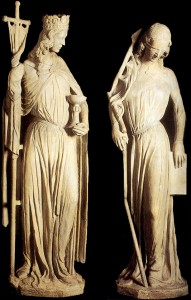
Typically, when I think about the relationship between early Christianity and Judaism, I picture binary opponents. That is, there are two extreme positions, each one deeming the other a heresy and, thus, self-identifying in relation to their extreme counterpart. More specifically, I picture Christians who viewed Judaism as antiquated, erroneous, or simply insufficient. On the other side, I picture non-Christian Jews viewing the Jesus movement as a heretical and defunct sect of Judaism, erroneously attesting to have certain ties to Judaism. Within this latter group I would also place Jewish Christians who would view Jesus and the movement associated with him as completely harmonious with Judaism and any Christian suggesting otherwise demonstrates in their beliefs that they are, in fact, not followers of the God of Judaism, and thus, not followers of Jesus.
This default picture of extreme parties having it out against their mirror opposites is a product of the common view that the NT authors represent such binary conflict. While I do not doubt that James and Matthew would have liked to punch Paul in the face (and vica versa), there seems to be evidence that there were “bipartisan” groups, who viewed the extremist’s as valid in their own way.
Finding this voice of a middle group is not always easy, for it is buried beneath the voice of its louder opponents. Nevertheless, it seems that we first hear of such a mediating view from Barnabas (late first–early second c.).
For Barnabas, the Jews never obtained the covenant. Just when they were about to receive it, they permanently lost it when Moses smashed the stone tablets on the ground. From that point on, according to Barnabas, the covenant was established for the Christians (4.6–8). “Christian” for Barnabas is strictly of a non-Jewish persuasion. In fact, to believe otherwise––that is, to believe that the Jews qua Jews also receive the covenant––is sinful. He writes:
Watch yourselves now and do not become like some people by piling up your sins, saying that the covenant is both theirs [Jews] and ours [Gentiles]. (4.6)
This statement reveals to us that there was a group of believers––whether of Jewish or Gentile origin––who believe that the Jesus movement is not an either/or but (perhaps) a both/and. In other words, there are some who do not see Jesus as a divisive line between Jews and Gentiles, but rather, Jesus was a mediator of a shared covenant.
This mediating position emerges again later in the second century in Justin’s Dialogue with Trypho. In the middle of Justin’s defense of the virgin birth, Trypho retorts:
Let you who are of Gentile origin…who are all named Christians after Christ, profess him to be Lord and Christ and God, as the Scriptures signify. But we Jews, who adore the God who made him, are not obliged to confess or worship him. (64.1)
Despite Justin’s excoriating response to Trypho’s inability to understand his argument, Justin is fairly “flexible” in what he views as acceptable conduct for Jewish converts to Christianity. For instance, when Trypho asks whether a Jew who confesses Jesus to be the Messiah and yet continues to observe the Mosaic Law, would still be saved, Justin responds:
In my opinion…I say such a man will be saved, unless he exerts every effort to influence other men [Gentiles]…to practice the same rites as himself, informing them that they cannot be saved unless they do so. (47.1)
Justin then speaks of “some Christians who boldly refuse to have conversation or meals with such persons [Jewish-Christian law observers]” (47.2); thus, showing that there was diversity in Gentile Christianity about the validity of Law observance for Jewish Christians. For Gentile Christians who observe the Mosaic Law, Justin is uncertain of their final outcome. For these, he can only say that they “will probably be saved” (v. 3). Finally, Justin states what he assumes to be the correct (“orthodox”) belief of the time, that Jews or Gentiles who only practice Jewish Law and deny Jesus, forfeit salvation (v. 4). There is no uncertainty in Justin’s tone here. Justin’s uncompromising tone (and the fact that he brings the issue up at all) suggests that there were Jews and/or Gentiles who argued that the “covenant is both theirs and ours” (Barn 4.6). In other words, it seems that Justin is reacting against a group who believes that Jesus is good for the Gentiles, Moses is good for the Jews, and both are from God; thus, both are acceptable.
At the beginning of the fourth century we find a text that stands between the extremes. The author/editor of the Pseudo-Clementine Homilies and Recognitions appears to be a Jewish Christian and sees no conflict between Jesus and the Torah or Moses. He writes:
If anyone has been thought worthy to recognize by himself both [i.e., Moses and Jesus] as preaching one doctrine, that one has been counted rich in God, understanding both the old things as new in time and the new things as old. (Hom. 8.7; cf. Rec. 4.5)
From this selection, the author/editor is similar to Matthew, in that Jesus is the like Moses and speaks and teaches in harmony with Moses. However, in the Recognitions we find a flexibility that we do not see in Matthew. In Matthew, those who reject Jesus’ interpretation of the Torah will be damned at judgment. In the Recognitions we read:
By which it is certainly declared, that the people of the Hebrews, who were instructed out of the law, did not know him [Jesus]; but the people of the Gentiles have acknowledged Jesus, and venerate him; on which account also they shall be saved, not only acknowledging him, but also doing his will. But he who is of the Gentiles, and who has it of God to believe Moses, ought also to have it of his own purpose to love Jesus. And again, the Hebrew, who has it of God to believe Moses, ought to have it also of his own purpose to believe in Jesus; so that each of them having in himself something of the divine gift, and something of his own exertion, may be perfect by both. (Rec. 5.5)
For the author/editor of the Recognitions, each group “ought” to recognize the validity of the other, but it is not commanded. It would seem that, for this author, the Gentiles are in good standing if they do not acknowledge Moses and the Law and the Jews are in good standing if they do not acknowledge Jesus. Perfection, though, is attained when the extreme parties acknowledge the beliefs and traditions of the other as acceptable before God.
I can only imagine that this group found itself getting beat over the head by both extremes (similar to the way bipartisan candidates today receive criticism from both Republican and Democrats). In the end, the extreme groups are often the loudest and most prolific in writing; thus, we find ourselves inundated with literature from the extreme parties. Perhaps, though, the best way to see the legitimacy of the work of God is through the eyes of the author/editor of the Pseudo-Clementine Homilies and Recognitions, who views the extreme factions as factions and perfection is attained when these factions cease and harmony among God’s people is realized.


